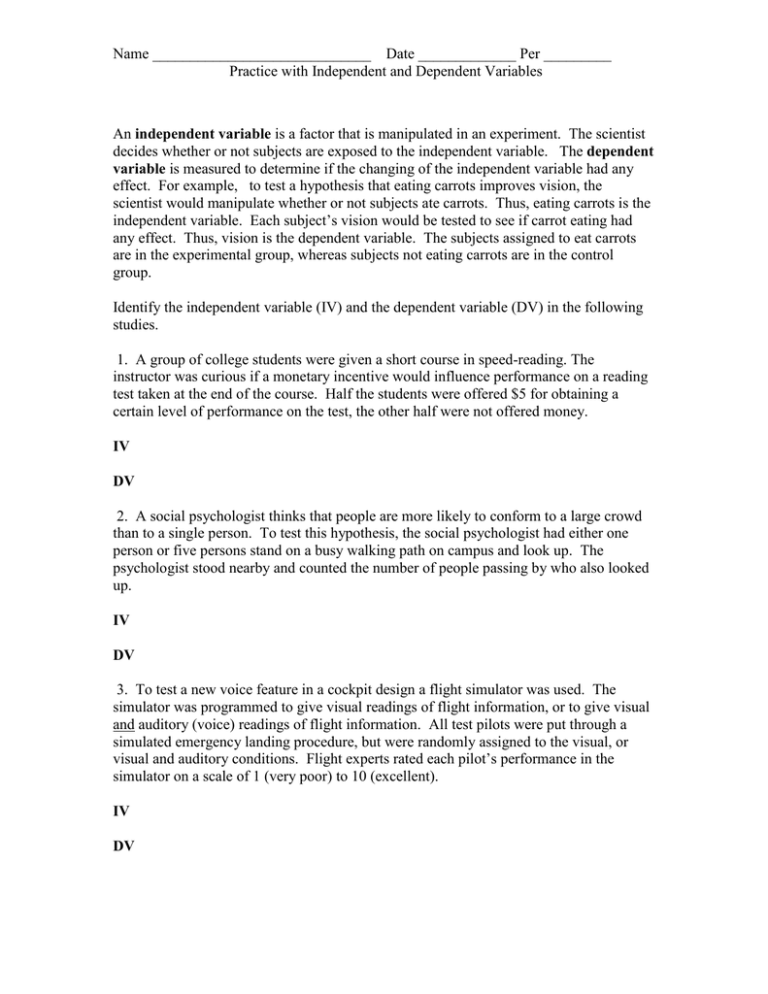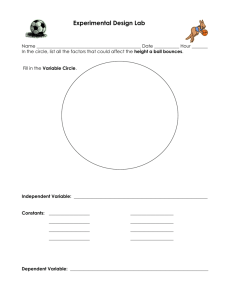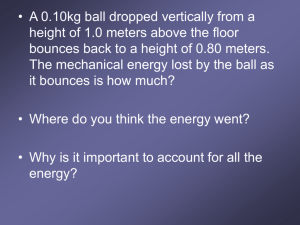Independent and Dependent Variables
advertisement

Name _____________________________ Date _____________ Per _________ Practice with Independent and Dependent Variables An independent variable is a factor that is manipulated in an experiment. The scientist decides whether or not subjects are exposed to the independent variable. The dependent variable is measured to determine if the changing of the independent variable had any effect. For example, to test a hypothesis that eating carrots improves vision, the scientist would manipulate whether or not subjects ate carrots. Thus, eating carrots is the independent variable. Each subject’s vision would be tested to see if carrot eating had any effect. Thus, vision is the dependent variable. The subjects assigned to eat carrots are in the experimental group, whereas subjects not eating carrots are in the control group. Identify the independent variable (IV) and the dependent variable (DV) in the following studies. 1. A group of college students were given a short course in speed-reading. The instructor was curious if a monetary incentive would influence performance on a reading test taken at the end of the course. Half the students were offered $5 for obtaining a certain level of performance on the test, the other half were not offered money. IV DV 2. A social psychologist thinks that people are more likely to conform to a large crowd than to a single person. To test this hypothesis, the social psychologist had either one person or five persons stand on a busy walking path on campus and look up. The psychologist stood nearby and counted the number of people passing by who also looked up. IV DV 3. To test a new voice feature in a cockpit design a flight simulator was used. The simulator was programmed to give visual readings of flight information, or to give visual and auditory (voice) readings of flight information. All test pilots were put through a simulated emergency landing procedure, but were randomly assigned to the visual, or visual and auditory conditions. Flight experts rated each pilot’s performance in the simulator on a scale of 1 (very poor) to 10 (excellent). IV DV Name _____________________________ Date _____________ Per _________ Practice with Independent and Dependent Variables 4. An experiment that tests how quickly different temperatures will dissolve sugar cubes. IV DV 5. An experiment that explores how different colors impact plant growth. IV DV 6. How much weight can different paper towel brands hold? IV DV 7. How does the temperature of a chemical reaction change over time? IV DV 8. As you run to the store, how does your distance change as time goes by? IV DV 9. "There will be a difference in graduation rates of high-school seniors who participate in an after school study program as opposed to those who do not participate in the study program." IV DV Name _____________________________ Date _____________ Per _________ Practice with Independent and Dependent Variables Multiple choice. _____10.In a controlled experiment, the variable that is changed to test the hypothesis is called the A. controlled variable B. responding variable C. dependent variable D. independent variable _____11.A student has a wagon of a certain mass. He plans to investigate how the acceleration of the wagon changes as the force he exerts on it increases. In his investigation, the independent variable is – A. the acceleration of the wagon B. the force acting on the wagon C. the mass of the wagon D. the mass of the student _____12.What happens to the dependent variable in a controlled experiment? A. It changes as the independent variable changes. B. It changes as the responding variable changes. C. It does not change. D. It is supported or disproved. _____13.In an experiment to find out how the height from which a student drops a ball affects how high the ball bounces, the independent variable is the – A. diameter of the ball B. force acting on the ball C. height that the ball bounces D. height from which the ball is dropped _____14.A student wants to conduct an experiment to find out how pulse rate changes as the length of tine spent exercising increases. The dependent variable will be – A. breathing rate B. pulse rate C. time spent exercising D. the kind of exercise _____15.A student hypothesized that the amount of sunlight a sunflower plant receives determines the number of sunflower seeds the plant produces. In her experiment, the number of seeds produces is the – A. dependent variable B. independent variable C. controlled variable D. manipulated variable Name _____________________________ Date _____________ Per _________ Practice with Independent and Dependent Variables _____16.A student is planning an experiment to find out how the height from which he drops a ball affects how high the ball bounces. The dependent variable is the A. diameter of the ball B. force acting on the ball C. height that the ball bounces D. height from which the ball is dropped _____17.In an experiment studying how increasing amounts of acid rain affect the number of organisms in a pond, which of the following would be the dependent variable? A. number of organisms in pond water B. acid rain and non-acid rain C. a mixture of pond water and acid D. organisms in rainwater _____18.In a scientific investigation, conclusions are drawn directly after – A. the hypothesis is revised B. results have been communicated to other scientists C. data have been interpreted D. the hypothesis has been stated _____19.In a controlled experiment, the independent variable is – A. the results of the experiment B. the variable that stays the same C. changed to test the hypothesis D. always time

